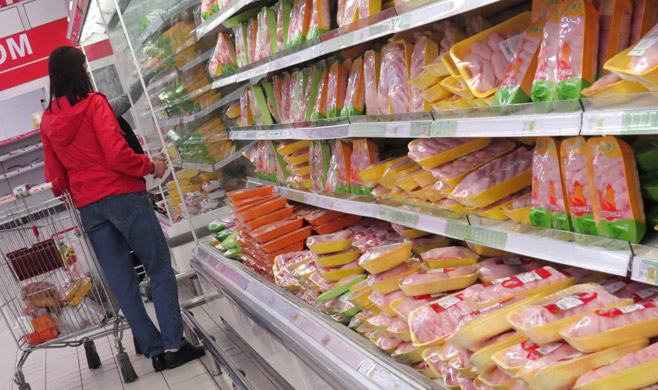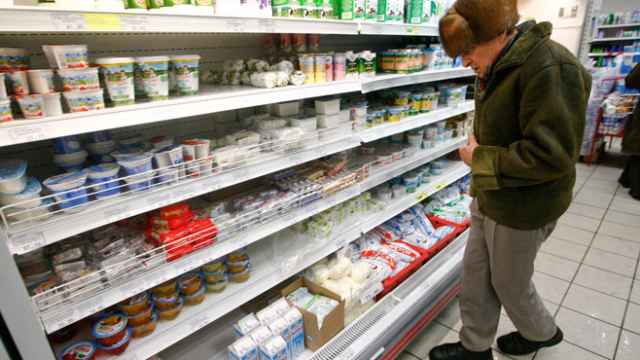
Some supermarket chains have announced a sharp jump in revenue, but shopping center vacancies are rising.
Import substitution and state orders must be supporting the manufacturing sector, as compared with other sectors of the Russian economy, Alexander Morozov, bank HSBC's chief economist for Russia and the CIS, said in a research note. "The overall situation in manufacturing looks rather stable. Cost-efficiency measures create a cushion against global market headwinds and high funding costs."
Retailers are struggling as consumer spending declines, but government orders may be supporting the manufacturing sector.
Yet many companies are reluctant to expand domestic production in case Russian sanctions prove short-lived, consultants suggest. Russian food producers, for example, are wary of adding to capital expenditure that was not budgeted for this year, said Andrei Chulakhvarov, head of the permanent staffing department at consultancy Coleman Services. "Producers face a simple choice: borrow money to build more production lines and increase output from existing lines, or just take advantage of falling foreign competition and raise wholesale prices."
Analysts continue to piece together information on how the economy is faring. In the past week the two biggest domestic food retailers reported a more than 20 percent rise in third-quarter turnover, though this may have been due to shoppers favoring grocers Magnit and X5 instead of more expensive ones.
There are other signs that the economy's driving force — consumers — is running out of steam. Real estate firm Jones Lang LaSalle reported that the vacancy rate in Moscow shopping centers nearly doubled, to 6 percent between the second and third quarters, partly due to retailers revising their development plans in light of Russians' weakening purchasing power and the slowdown in retail sales growth.
The decline in consumption has already negatively influenced company profits, Yelena Zadorozhnaya, head of tenant representation for the Russian and CIS retail department at Jones Lang LaSalle, said in a research note. "Consequently, retailers are carefully evaluating their plans. Some have even closed their stores as a result of significant losses in profit."
On the other hand, there is no panic response to the sanctions, said Nick Rees, managing director of recruitment firm Progressive Global Energy. "If you look at FMCG [fast-moving consumer goods] … they have all gone down about 25 percent year-on-year, so we were looking at a negative trend before sanctions. However, the sanctions have made people think more short-term."
The positive result for Rees's company is that employers are hiring more staff on short-term contracts of six or nine months. "Outstaffing has gone through the roof, probably because it is the easiest option for companies. In oil and gas, where the staff work on rotation, it gives companies more time to assess individuals."
While sanctions have hit Exxon's involvement in the Kara Sea project, they also restrict oil-field services companies like Halliburton from working with Rosneft. However, such companies are still able to provide "lower-tech" conventional services. Some companies are cutting down on EU hires, which in practice means Scottish oil and gas specialists, and are looking to Asia or Latin America.
In the broader economy, most hiring being done this year is key hiring for important roles, either as a replacement or for new positions or growth, said Teri Lindeberg, CEO of recruitment firm Staffwell. "This particular type of hiring is still seeing, at times, up to a 20 percent increase in compensation."
Few Russian or foreign companies have openly declared a hiring freeze, said Yelena Rogova, marketing communications manager of recruitment firm Hays Russia. "Several international pharmaceutical producers shared their estimated revenue growth for next year, and this is expected to be in the double digits. In contrast, auto sales in Russia have been shrinking and will continue to decline; this is one of the weakest markets at present in Russia."
Contact the author at m.gay@imedia.ru
A Message from The Moscow Times:
Dear readers,
We are facing unprecedented challenges. Russia's Prosecutor General's Office has designated The Moscow Times as an "undesirable" organization, criminalizing our work and putting our staff at risk of prosecution. This follows our earlier unjust labeling as a "foreign agent."
These actions are direct attempts to silence independent journalism in Russia. The authorities claim our work "discredits the decisions of the Russian leadership." We see things differently: we strive to provide accurate, unbiased reporting on Russia.
We, the journalists of The Moscow Times, refuse to be silenced. But to continue our work, we need your help.
Your support, no matter how small, makes a world of difference. If you can, please support us monthly starting from just $2. It's quick to set up, and every contribution makes a significant impact.
By supporting The Moscow Times, you're defending open, independent journalism in the face of repression. Thank you for standing with us.
Remind me later.





